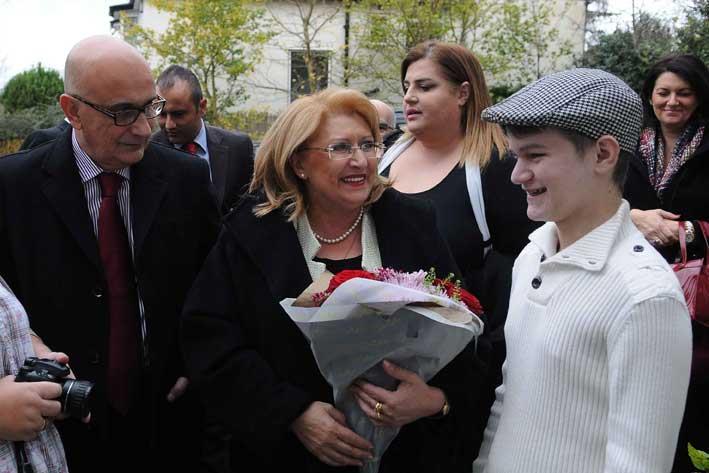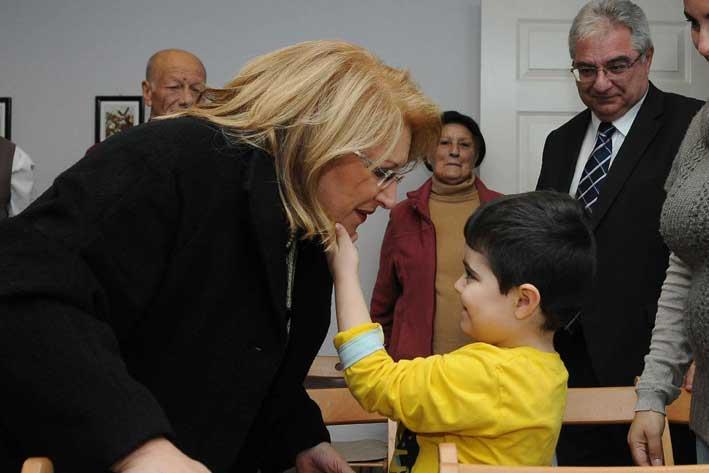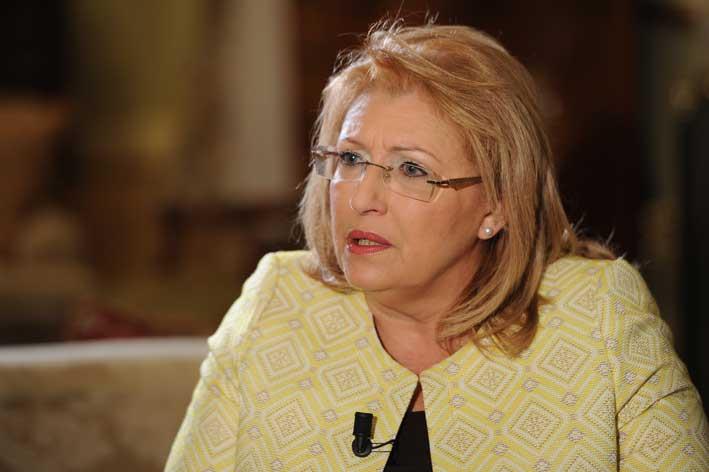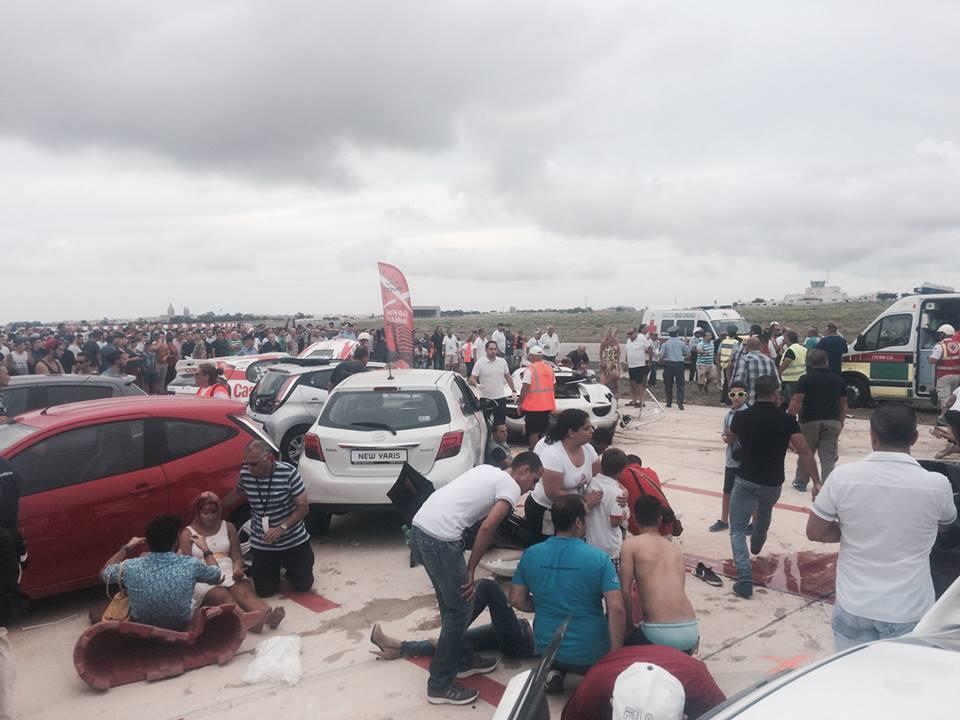THE PRESIDENT OF THE REPUBLIC explains to The Malta Independent on Sunday how she often feels fragile and emotional after meeting young Maltese patients. She talks to Neil Camilleri about next Saturday’s L-Istrina campaign and how the Malta Community Chest Fund is now a properly regulated and transparent foundation and also says it is too early to say whether Paqpaqli għall-Istrina will feature in Malta’s biggest charity fundraiser in the future.
“It is not the first time that we cried after visiting child patients in hospitals abroad and in Malta,” an emotional President Marie-Louise Coleiro Preca told The Malta Independent on Sunday in an exclusive interview.
The Maltese Head of State came close to tears when asked how she felt when she visited children in hospitals abroad, especially at Christmas time, with the young patients being unable to spend the holidays at home, with their families.

“I always think about the patients. I do so with a heavy heart. I feel very fragile before pain and suffering. The last time we were in London we met a 12-year-old girl in hospital, as well as a number of babies. When I see young patients I say to myself: ‘What have I given more to God than these children’s parents?”
Mrs Coleiro Preca said such encounters leave her “emotionally shattered” but she makes a point of keeping in touch with the patients. “My office keeps in touch with our patients and follows up on their progress. Sometimes I call them personally to ask if everything is ok and if they need anything. I cannot manage to do this all the time and with everyone but I try to speak to as many people as possible in the limited time I have.”

She was speaking ahead of this year’s edition of L-Istrina, the annual campaign to raise funds for the Malta Community Chest Fund. Many Maltese patients who require treatment abroad, as well as their accompanying relatives, receive financial assistance from the MCCF.
The 60-year-old institution, which became a foundation in April, is now more transparent and accountable and is regulated by the Civil Code.
“It remains our national charity, reaching people whose needs are not met by the National Health System (NHF). While the NHS provides chemotherapy, the MCCF pays for more specialised treatment that is not yet provided by the state. We also help disabled people with equipment and give financial assistance to sick people who are unable to cope. I am not only speaking about the poor here. People might be well off until illness strikes, until they are forced to quit their job and the medical bills start accumulating,” Mrs Coleiro Preca says.
“The MCCF is not the only entity that organises big charity events. Quite a number of NGOs also do it and some are also subsidised by the government for the services they provide. The MCCF has to do its part and strives to raise enough funds: if it doesn’t, there will not be enough money to help all those who are desperately in need. We would not have the funds to cover medical expenses, equipment and assistance.”
The President says that since becoming a foundation, the MCCF has developed a structure that includes policymaking, implementation and a number of specialised and focused units, including finance, an appeals board and an ethics board. “We have to ensure that we give 200 per cent value for the money given through Maltese generosity and 200 per cent transparency and accountability to the public, without which the foundation would not exist.”

Should the state do more?
Asked if the state should do more to help people currently receiving assistance from the MCCF, the President says a distinction has to be made between the services provided by the government and those taken care of by the MCCF.
“The foundation does not have unlimited financial assets and cannot give universal health coverage like the NHS. That is why it limits its assistance to people who have financial difficulties.
“We have to carry out means-testing and we have now also introduced social assessments to ensure that we address peoples’ needs in a holistic manner.”
The President spoke about her recent visit to London. Medical treatment is provided free of charge, thanks to a long-standing agreement between the Maltese and UK governments, but the MCCF helps patients and their relatives by paying for travel, food and accommodation.
Mrs Coleiro Preca says there is also a plan to start offering them psycho-social support. “Despite receiving the best medical care, patients still become depressed and feel lost, because of the trauma associated with sickness and separation from their families and even the fact that they have to speak in another language when they are at their most vulnerable. Many Maltese people converse well in English yet they still say ‘ajma’ in Maltese!”
The MCCF is evaluating different options in order to be able to introduce the service in the UK, and in particular in the London area.

I will not set a target
She says she has not set a target for this year’s fundraiser and will not do so. “I do not want to be imprudent and give an amount. I am convinced that, as usual, the Maltese will not let down those of their brothers and sisters who need help.” She noted that costs increase year after year but said that “instead of setting a target I will leave it to the Maltese public’s generosity. In fact, I am taking the opportunity to thank them from now.”
The President confirmed that the L-Istrina campaign – as was the case last year – is less focused on the faces of those who are suffering. “We wish to avoid exposing people unnecessarily. Don’t get me wrong, there will be individuals who come forward under their own steam and offer to show their face and share their experience. But Malta is a small country where everyone knows everyone else – a face is not easily forgotten. We have to be sure that our generosity will be given with dignity towards the people in need. L-Istrina has become an annual national event and hence, we are just reminding people that it is coming up in a few days’ time so there is no reason to plaster people’s faces all over Malta. We also have to show the positive side of things, not only pain and suffering.
We want to give hope and peace of mind”.

A more regulated system
The President announced that non-registered NGOs would not be eligible for funds as from this year.
“Last year I was in constant contact with the bishops to see what situation church organisations were in with regards to their registration. I was informed that all efforts were being made to register these charities by 2015. The reason that last year we accepted non-registered organisations was because, how can we refuse to allocate funds for a social project, for example submitted by Dar tal-Providenza or Caritas? I am happy that things are now much more regulated.”
The President said that this year “we have made substantial changes to the whole selection process. We asked a number of social experts to establish social priorities”.
The Malta Community Chest Fund is also encouraging NGOs to apply for joint projects to encourage partnership and collaboration, and has also capped the grant amounts, which means that a bigger number of charities can benefit.
“We issued two calls for NGOs this year. Following the first call, for social projects, the second call was for infrastructural works for NGOs and we are now evaluating those requests. 65 NGOs have benefitted from the €900,000 allocated from l-Istrina 2014.”

All but one Paqpaqli victims now back home
Naturally, this newspaper asked about October’s Paqpaqli għall-Istrina incident, in which 26 people were injured, some quite seriously. “I can’t tell you much because I only know what everyone else knows. There is an ongoing magisterial inquiry and unfortunately I cannot speak – not because I don’t want to but because I should not interfere with a legal process.”
The President said the most important thing at this point was that the injured were recovering and that all except one, had now returned home. “The man who was most seriously hurt is no longer in the ITU and is undergoing rehabilitation. All the others are at home, even those who suffered fractures and are still recovering. Things will become clearer once the magisterial inquiry is concluded. We will analyse its conclusions and act upon them.”
The President said she has kept in touch with the victims. “I always feel responsible when people are injured, not just as the President. I have always done this. It is a devastating situation when you go out to have fun and end up injured – not only for yourself but for your whole family. I try to offer my support, and I do this away from the TV cameras.”
Asked if the popular Paqpaqli event would feature in future editions of L-Istrina, Mrs Coleiro Pea said it was too early to say. “I do not wish to be imprudent and so have to wait for the conclusions of the magisterial inquiry conclusions, which will certainly have some bearing on that decision.”